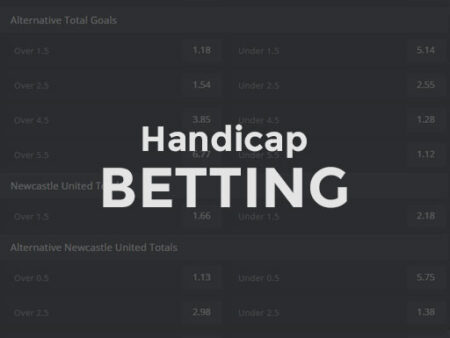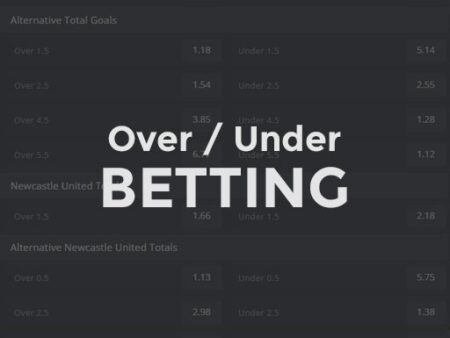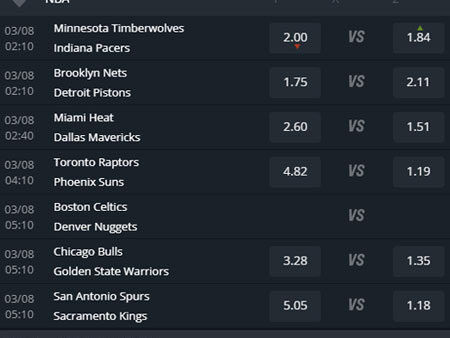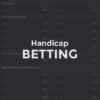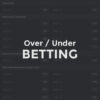Sports betting can be daunting for newcomers and seasoned bettors alike.
This comprehensive betting glossary covers key sports betting terms from A to Z, ensuring you’re well-prepared to make informed wagers.
A
Accumulator (Acca): This is when you’re feeling adventurous and decide to combine several bets into one. If all your picks come true, you hit the jackpot. If even one lets you down, it’s a bit like expecting a text back from someone who’s ghosted you – a bit disappointing.
Arbitrage Betting: A strategy involving placing bets on all possible outcomes of an event across different bookmakers, guaranteeing a profit regardless of the result. It’s like hedging your bets in a way that you win no matter what.
Asian Handicap: A form of betting that levels the playing field between two unevenly matched teams by applying a goal handicap to each side. This method reduces the possible number of outcomes from three (in traditional 1X2 wagering) to two by eliminating the draw outcome.
B
Backdoor Cover: This occurs when a team scores points at the very end of a game to cover the point spread unexpectedly. It’s the betting equivalent of a plot twist in a movie.
Bad Beat: Losing a bet you should have won. It’s like having the rug pulled out from under you at the last second.
Bankroll: This is the stash of cash you’ve set aside for betting, not to be confused with your grocery money. Managing this wisely is like balancing a diet; too much junk (or risky bets) and you’re in trouble.
Bookmaker (Bookie): The guy or establishment taking your bets. Think of them as the barista of the betting world; they take your order (bet), but whether you’ll enjoy the coffee (outcome) is out of their hands.
C
Chalk: The favorite in any match-up. Betting on the chalk is like rooting for Goliath over David – safe, but sometimes you miss out on the thrill of an upset.
Closing Line: The final betting line before the game or event begins. It’s the last call for bets, much like the final boarding call for a flight.
Cover: When a favorite wins by more than the point spread or an underdog loses by less than the spread. It’s like acing a test when you only needed a passing grade – overachieving at its finest.
D
Dime: Slang for a $1,000 bet. It’s not literally ten cents; in the betting world, things are a bit more high stakes.
Double Chance: A betting option that allows you to cover two of the three possible outcomes in a game with one bet – either the home team wins, the away team wins, or the game ends in a draw.
E
Early Cash Out: A feature offered by some bookmakers where you can settle a bet before the event has concluded, securing part of your winnings or cutting your losses.
Edge: Having an advantage over the bookie. It’s like knowing a secret ingredient in a recipe that makes your dish stand out.
Exotic Bet: Any wager other than a straight bet or parlay – think prop bets or futures. It’s the spice of life in betting; variety is key.
Exposure: The amount of money a sportsbook stands to lose on a game. It’s the risk the house takes on, much like an investor’s stake in the market.
F
Fade: To bet against a trend or a specific bettor. It’s like disagreeing with a popular opinion because you’ve got a hunch you’re right.
Fixed Odds: A type of betting where the odds are agreed upon when the bet is placed. If your bet wins, you’re paid out at those odds, even if they subsequently change.
Flat Betting: A strategy where you bet the same amount (or unit) on every game, as opposed to varying your bet size. It’s a methodical approach, aiming for consistency over big swings.
Futures: Bets placed on events that will happen down the line, like betting on who will win the Super Bowl before the season starts. It’s like buying Christmas presents in July; you’re planning ahead.
G
Gamble: To take a risky action in the hope of a desired result. It’s the heart and soul of betting – sometimes you’ve got to roll the dice and hope for the best.
Goliath: A massive bet consisting of 247 bets involving eight selections in different events. The bet includes everything from doubles, trebles, and accumulators up to an eightfold accumulator.
H
Handicap: A system used to level the playing field between teams of different strengths by applying a point spread. It’s like giving the slower runner in a race a head start.
Hedge: Placing bets on opposite outcomes to guarantee a profit or minimize loss. It’s like buying insurance on your vacation; it dampens the thrill but secures peace of mind.
Heinz: A bet consisting of 57 bets involving six selections in different events. It includes doubles, trebles, fourfold accumulators, fivefold accumulators, and a sixfold accumulator.
I
In-Play Betting: Betting on a game while it’s happening. It’s the real-time strategy game of betting; adapt and conquer.
J
Jackpot: The maximum win from a single bet. Hitting the jackpot is like finding a golden ticket – rare but life-changing.
Juice (Vig): The commission the bookie takes on bets. It’s the price of doing business, like paying for a concert ticket’s service fee.
K
Kelly Criterion: A formula used to determine the optimal size of a series of bets. In betting, it’s akin to a secret recipe – follow it closely for the best results.
Key Number: In sports betting, especially football, certain numbers (like 3 and 7) are considered more important because games commonly end with these margins of victory. Betting strategies often revolve around these numbers.
L
Lay Betting: The process of betting on something not to happen. You’re essentially playing the role of the bookmaker, offering odds to other bettors.
Limit: The maximum bet size a bookmaker will accept. It’s the speed limit of betting; it keeps the thrill in check.
Live Betting: Similar to in-play betting, it allows you to place bets as the action unfolds during the game. It’s like playing a video game where the rules change as you’re playing.
Lock: A bet that is considered extremely likely to win. It’s as close to a sure thing as you can get in the unpredictable world of sports betting.
M
Margin: The difference between the odds for the favorite and the underdog. Wider margins mean a bigger discrepancy between the teams’ perceived chances of winning.
Martingale System: A betting strategy that involves doubling the size of your bet after each loss. The theory is that when you eventually win, you’ll recover all previous losses plus a profit equal to the original bet. It’s a risky play, akin to doubling down in an effort to beat the house.
Matched Betting: A technique using the free bets offered by bookmakers to guarantee a profit. Think of it as couponing, but instead of saving on groceries, you’re earning from bets.
Middle: To bet on both sides of a game at different point spreads or totals, aiming to win both bets if the final score lands in the middle of the two bets. It’s like playing both sides in chess – a strategic move if you can pull it off.
Moneyline: A bet on who will win the game outright, no point spreads involved. Simple, like choosing between chocolate and vanilla. Check out this guide dedicated to moneyline betting.
N
No Action: A bet that is canceled for any reason, and all money is refunded. It’s like getting a rain check from the universe on your bet.
O
Odds Compiler: The person (or team) at a bookmaking firm who sets the odds for events. They’re the architects of the betting world, crafting the numbers that drive the action.
Off the Board (OTB): When a bookmaker takes down a betting line and is no longer accepting bets on it, usually due to uncertainty about an event. It’s like a concert being sold out before you could get tickets.
Over/Under (Totals): A bet on whether the total score will be over or under what the bookie predicts. It’s like guessing the number of candies in a jar.
Overround: The practice of setting the odds so that the sum of the probabilities for all possible outcomes exceeds 100%. This is how bookmakers secure their profit margin.
P
Parlay: A combo bet where you pick multiple outcomes. All must win for you to collect. High risk, high reward – like ordering a mystery box online.
Patent: A bet involving three selections and seven bets – three singles, three doubles, and one treble. It’s a way to spread out your risk across multiple outcomes.
Payout: The total amount you receive from a winning bet, including your initial stake. It’s payday in the betting world.
Pleaser: A type of bet that is the opposite of a teaser. Instead of moving the line in your favor, you move it against your favor in exchange for better payout odds. It’s like opting for hard mode in a game for greater rewards.
Prop Bet (Proposition Bet): A bet on something other than the outcome of the game, like which player will score first. It’s the trivia night of betting; specifics matter.
Public Money: The majority of bets placed by the general public on a particular game. It’s the betting equivalent of following the crowd.
Push: When the outcome of a game lands exactly on the spread, and everyone gets their money back. It’s like planning an outdoor party and it rains; a bummer, but you regroup.
Q
Quarter Bet: A bet placed on the outcome of a specific quarter in a game. It’s a way to focus your betting strategy on a shorter, more predictable part of the event.
Quinella: A bet in horse racing where you pick the first two finishers in any order. It’s like a two-for-one deal where the order doesn’t matter.
R
Reverse Line Movement: When betting lines move opposite to the betting percentages. For example, if most bets are on Team A, but the line moves to make Team A less favorable, that’s reverse line movement. It often indicates sharp or professional betting action.
Runner: Someone who places bets for another person. Think of them as your personal betting concierge.
Rollover: A requirement set by online sportsbooks that a bettor must meet before being allowed to withdraw a bonus. It’s like playing through the levels of a video game before you can claim the big prize.
Round Robin: A series of parlays involving three or more teams in different combinations. It’s a complex betting strategy for those looking to diversify their risk.
S
Scalping: This involves placing bets on both sides of the market at different prices with the aim of making a profit regardless of the outcome, often taking advantage of the bookmaker’s adjustments.
Sharp: A professional bettor who often knows more than the average Joe. The Sherlock Holmes of betting, if you will.
Sportsbook: An establishment that accepts bets on sports events. It’s essentially a marketplace for bettors to wager on various outcomes.
Square: A novice in the betting world; someone who might not be as savvy about the ins and outs. It’s the new kid on the block in betting terms.
Stake: The amount of money placed on a bet. It’s essentially your investment in the outcome of the event.
Steam: A sudden, drastic and uniform line movement across the sports betting marketplace. It’s like a herd of buffalo moving all at once; you know something significant is causing it.
Super Yankee (Canadian): A bet consisting of 26 bets involving five selections in different events. It includes ten doubles, ten trebles, five fourfold accumulators, and a fivefold accumulator.
T
Teaser: A type of parlay that lets you adjust the point spread, making it easier to win your bets but reducing the payout. It’s like choosing the easy level on a video game; less glory, but more chance of success.
Ticket: A bettor’s receipt for a wager, serving as a record of the bet placed. It’s your official entry into the betting event, much like a lottery ticket.
Totals Bet: A bet on the combined score of both teams at the end of a game. You bet on whether the total will be over or under a line set by the bookmaker.
Tout: An individual or service that offers betting picks and advice, often for a fee. It’s like a tour guide for betting, showing you the way, hopefully, to treasure and not to a tourist trap.
Tricast: A bet where you predict the first, second, and third place finishers in exact order. It’s like hitting the bullseye in darts – challenging but rewarding.
Triixie: A bet consisting of four bets involving three selections in different events. This includes three doubles and one treble, allowing for a margin of error while still offering the chance for a significant payout.
U
Underdog: The team or individual considered likely to lose. Rooting for the underdog is like cheering for the little engine that could.
Unit: A standard measure of size for a bet, relative to the bettor’s bankroll. It helps manage risk by keeping bets proportional to the total amount a bettor is willing to wager.
V
Value Bet: Finding a bet that seems to offer higher odds than you’d expect. It’s like spotting a designer brand in a thrift store – a steal that’s hard to pass up.
Vig Free: Betting lines or markets offered without the standard bookmaker’s commission. It’s like finding a no-fee ATM; the cost of play is reduced.
Vigorish (Vig): Another term for the bookmaker’s commission on bets. It’s the cost of admission to the betting show.
Void Bet: This is when your bet is canceled, and your stake is returned. Imagine prepping for a big night out, only to have your plans fall through; disappointing, but at least you’re not out of pocket.
Volatile Market: A betting market that is subject to rapid and significant changes due to various factors like player injuries or weather conditions. It’s as unpredictable as a stock market on a bad day.
W
Wager: Simply put, another word for bet. It’s the formal attire of betting terminology; sounds fancier, but it’s all the same at the end of the day.
Whale: A bettor who consistently makes large bets. Think of them as the high rollers of the sports betting world.
Wire-to-Wire: This is when a team leads a game from start to finish and wins. It’s like a front-runner in a marathon who takes the lead at the gunshot and never looks back.
Wise Guy: A knowledgeable, well-informed sports bettor who typically bets large amounts. It’s the guru of the betting world, the one you might want to follow but also outsmart.
Wong Teaser: A strategy that involves using teasers in a way that takes advantage of the most favorable point spreads in football betting, named after the author Stanford Wong.
X
X-Factor: An unpredictable element that could significantly impact the outcome of a bet. It’s the wildcard that keeps things interesting.
Y
Yankee: A type of bet consisting of 11 bets on four different selections in different events. It’s like a betting combo meal – more variety, more chances to win.
Yield: The profit or loss generated from your betting, usually expressed as a percentage. It’s the report card of your betting strategy – showing whether you’ve passed with flying colors or need to hit the books again.
Z
Zig Zag Theory: A betting strategy that suggests betting on a team to bounce back after a loss, especially during playoffs. It’s the belief in the comeback kid; everyone loves a good redemption story.

